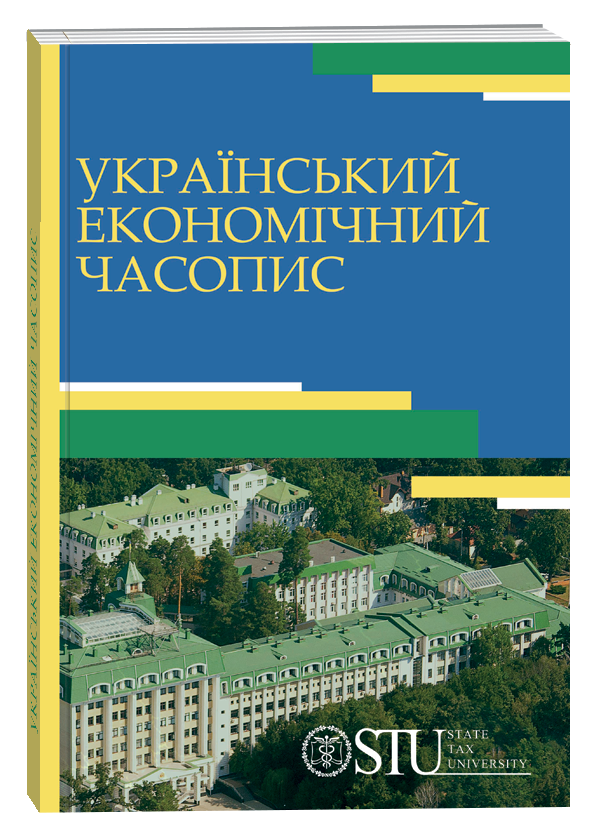THE MAIN TRENDS OF INFORMATION SYSTEMS AND COMPUTER TECHNOLOGIES DEVELOPMENT AS A FACTOR OF TRANSFORMATIONAL CHANGES IN THE ACCOUNTING AND ECONOMIC SYSTEM OF SOCIETY
DOI:
https://doi.org/10.32782/2786-8273/2024-5-10Keywords:
informatization, information systems, Computer Technology, information and digital technologies, digitization of economic processesAbstract
Introduction. The need to find new approaches and methods of managing socio-economic objects is becoming more relevant as a result of increased competition, the rapid pace of scientific and technological progress, integration and globalization phenomena in the economy, as well as the complication of political problems and the emergence of armed conflicts. That is why the functioning of domestic enterprises is directed to the production of profit, high-quality products, the introduction of innovations, as well as the need to use the potential of informatization when building a management system, which will increase competitiveness and ensure the economic growth and development of the enterprise both today and in the long term. However, many issues of the use and development of information systems and computer technologies in today's complex conditions remain unsolved. Purpose. The purpose of the research is to determine the features of functioning and directions of further development of socio-economic systems under the conditions of active implementation of information and digital technologies. Methods. The main research methods used in writing the paper include: methods of comparative analysis – to determine the features and directions of further development of socio-economic systems under the conditions of active implementation of information and digital technologies; systemic approach – for the study of socio-economic systems as a complex element as a complex element; method of systematization – in the study of statistical information; theoretical knowledge and generalization – when researching scientific and methodological materials, writing an introduction and conclusions. Results. Based on the results of the research, the specifics and directions of the development of information systems and computer technologies as a factor of transformational changes in the accounting and economic system of society were determined. Conclusion. According to the results of the conducted research, it was established that the rapid pace of development of science and technology creates prerequisites for the need for managers of different levels of management to obtain relevant information and make reasonable management decisions in the conditions of informatization of economic processes. This requires a comprehensive approach to the introduction of information and digital technologies and the creation of prerequisites for their constant updating, especially in today's complex socio-economic and political conditions. It is modern information and digital technologies that today are able to solve extremely complex tasks of managing activities in various spheres, as well as contribute to the development of adaptive mechanisms in socio-economic systems for the ability to resist external challenges and threats. The conducted analysis of statistical information proved that, despite the significant number of existing positive changes, enterprises and institutions have a strong potential for the further development of information and digital technologies, and one of its components is increasing the effectiveness of the implementation of the principles of sustainable economic development based on the informatization of socio-economic processes .
References
Державний комітет статистики України. URL: http://www.ukrstat.gov.ua.
Джулій Л.В. Передумови формування нової парадигми бухгалтерського обліку за умов сталого розвитку. Матері¬али VІ Всеукраїнської науково-практичної інтернет-конференції «Фінансово-економічне та обліково-аналітичне забез¬печення в управлінні діяльністю суб’єктів господарювання в контексті інноваційного розвитку», 24 квітня 2024 р. URL: http://www.htek.km.ua/
Лазебник Л.Л., Войтенко В.О. Інформаційна інфраструктура в цифровізації бізнес-процесів підприємства. Науковий вісник Міжнародного гуманітарного університету. 2020. Випуск 42. С. 18–22. URL: http://www.vestnik-econom.mgu.od.ua/ journal/2020/42-2020/5.pdf
Муравський В.В. Комп’ютерно-комунікаційна форма обліку : монографія. Тернопіль : ТНЕУ, 2018. 486 с.
Національна економічна стратегія 2030. URL: https://nes2030.org.ua
Пантєлєєва Н.М. Цифрова економіка як ключовий тренд розвитку постіндустріального суспільства: монографія / За ред. Н.М. Пантєлєєвої, С.Ю. Колодія, М.А. Ребрика. Київ : ДВНЗ "Університет банківської справи", 2019. 299 с.
Селезньова Г.О., Іпполітова І.Я. Ефективність системи управління підприємством. Інфраструктура ринку. 2020. Вип. 39. С. 238–244. URL: http://www.nbuv.gov.ua/UJRN/ifrctr_2020_39_41
Селезньова Г.О. Процеси цифровізації економіки та їх вплив на конкурентне середовище. Актуальні проблеми іннова-ційної економіки та права. 2023. № 1–2. С. 6–12. URL: http://www.nbuv.gov.ua/UJRN/apie_2023_1-2_3
Стратегія розвитку інформаційного суспільства. URL: https://zakon.rada.gov.ua/laws/show/386-2013-%D1%80
Чукут С.А., Клименко І.В., Линьов К.О. «Електронний уряд». URL: http://www.ktpu.kpi.ua/wp-content/uploads/2016/02/Elektronnij-uryad_nauk_prak-dovidnik_CHukut_Linov_Klimenko.pdf
Voynarenko M., Yemchuk L., Dzhuliy L. New Realities of the Enterprise Management System Information Support: Eco¬nomic and Mathematical Models and Cloud Technologies. Journal of Information Technology Management (JITM). 12(3), 4460. Homepage: http://www.article_76293_2b4c5c486fcfbc80da9425d1aaea160 pdf. DOI: https://doi.org/10.22059/JITM.2020.76293.
State Statistics Committee of Ukraine. URL: http://www.ukrstat.gov.ua
Julia L.V. (2024) Prerequisites for the formation of a new paradigm of accounting under conditions of sustainable development. Materials of the VI All-Ukrainian Scientific and Practical Internet Conference "Financial-Economic and Accounting-Analytical Support in the Management of Business Entities in the Context of Innovative Development", April 24, 2024. URL: http://www.htek.km.ua
Lazebnyk L.L., Voitenko V.O. (2020) Information infrastructure in digitalization of enterprise business processes. Scientific Bulletin of the International Humanitarian University. Issue 42. P. 18–22. URL: http://www.vestnik-econom.mgu.od.ua/journal/ 2020/42-2020/5.pdf
Muravsky V.V. (2018) Computer-communication accounting form: monograph. Ternopil: TNEU, 486 p.
National Economic Strategy 2030. URL: http://nes2030.org.ua
Panteleeva N.M. (2019) The digital economy as a key trend in the development of post-industrial society: monograph / Ed. N.M. Panteleeva, S.Yu. Kolodiya, M.A. Ladder. Kyiv: DVNOZ "University of Banking", 299 p.
Seleznyova G.O., Ippolitova I.Ya. (2020) Effectiveness of the enterprise management system. Market infrastructure. Issue 39, pp. 238–244. URL: http://www.nbuv.gov.ua/UJRN/ifrctr_2020_39_41
Seleznyova G.O. (2023) Processes of digitalization of the economy and their impact on the competitive environment. Current problems of innovative economy and law, no. 1–2, pp. 6–12. URL: http://www.nbuv.gov.ua/UJRN/apie_2023_1-2_3
Information society development strategy. URL: https://zakon.rada.gov.ua/laws/show/386-2013-%D1%80
Chukut S.A., Klymenko I.V., Lynev K.O. "Electronic Government". URL: http://www.ktpu.kpi.ua/wp-content/uploads/2016/02/Elektronnij-uryad_nauk_prak-dovidnik_CHukut_Linov_Klimenko.pdf
Voynarenko M., Yemchuk L., Dzhuliy L. New Realities of the Enterprise Management System Information Support: Economic and Mathematical Models and Cloud Technologies. Journal of Information Technology Management (JITM). 12(3), 4460. Homepage: http://www.article_76293_2b4c5c486fcfbc80da9425d1aaea160 pdf/. DOI: https://doi.org/10.22059/JITM.2020.76293.



